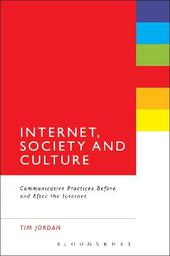
|
Internet, Society and Culture: Communicative Practices Before and After the Internet
Paperback / softback
Main Details
| Title |
Internet, Society and Culture: Communicative Practices Before and After the Internet
|
| Authors and Contributors |
By (author) Dr Tim Jordan
|
| Physical Properties |
| Format:Paperback / softback | | Pages:176 | | Dimensions(mm): Height 229,Width 152 |
|
| ISBN/Barcode |
9781628923483
|
| Classifications | Dewey:302.20285 |
|---|
| Audience | | Tertiary Education (US: College) | |
|---|
|
Publishing Details |
| Publisher |
Bloomsbury Publishing Plc
|
| Imprint |
Bloomsbury Academic USA
|
| Publication Date |
17 July 2014 |
| Publication Country |
United States
|
Description
The internet has changed the way we communicate and so changed society and culture. Internet, Society, and Culture offers an understanding of this change by examining two case studies of pre and post internet communication. The first case study is of letters sent to and from Australia in 1835-1858 and the second is a study of online gaming. In both case studies, the focus is on the ways communication is created. The result is the definition of two types of communication that are lived simultaneously in the twenty-first century. One type of communication is from before the internet and relies on the body having touched and created a message-for example, by attaching signature-to stabilise the nature of sender, message and receiver. Internet-dependant communication is different because no identity-marker can be trusted on the internet and so individuals' styles of communicating are used to stabilise the transmission of messages. Being after the internet means having to live these two contradictory forms of communication.
Author Biography
Tim Jordan is a Senior Lecturer at King's College London, leading development there of analysis of digital culture. He is a member of two departments, Culture, Media and Creative Industries and Digital Humanities. Tim has been involved in analysis of the social and cultural meaning of the internet and cyberspace since the mid-1990s, as part of which he has published the books: Hacking: digital media and technological determinism (2008), Cyberpower (1999) and, with Paul Taylor, Hacktivism and Cyberwars (2004). He is a founding editor of the Taylor and Francis journal Social Movement Studies.
ReviewsIn Internet, Society, and Culture, Tim Jordan traces how people who have nothing and everything to share in their everyday communications use the technologies at hand to sustain a fantasy of presence, even when communicating with remote others. By contrasting the letter writing practices of Australian early colonizers with the contemporary performative practices of gamers colonizing virtual spaces, Tim Jordan explains how people play with matter, performativity and presence to tell stories that both stabilize and reinvent the place of the self at a given point in time. Original, imaginative and sharp. -- Zizi Papacharissi, Professor and Head of Communication, University of Illinois-Chicago
|